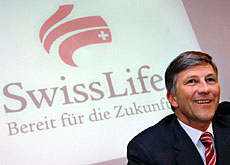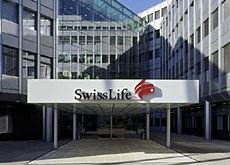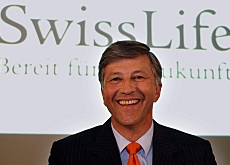Swiss Life looks to grow organically

Switzerland's largest life insurer is well positioned to hit its SFr1 billion ($0.77 billion) profit target in 2008, Swiss Life chief executive Rolf Dörig tells swissinfo.
Dörig also announced organic growth expectations of eight per cent in Switzerland and 23 per cent abroad in the next three years as the firm posted record profits for 2005.
However, he does not rule out using large cash reserves to make modest acquisitions.
Alongside Dörig, swissinfo asked Paul Müller, CEO of the company’s Swiss division, why growth in the home market lags behind other European countries, and why an increase in the retirement age could hit profits.
swissinfo: Rolf Dörig, you have set a target for organic growth, but are you ruling out acquisitions?
Rolf Dörig (CEO, Swiss Life): The targets we have set are purely driven by organic growth in the markets we are already in [as well as by] increased profitability and efficiency.
Although we have the capital to acquire small and medium sized portfolios we will not pursue this actively. We may have an opportunistic look at some portfolios in the market we are already in, but they would have to be of a very high quality.
Acquisitions take a lot of resources and experience tells us that only eight out of ten mergers or acquisitions turn out to be profitable.
swissinfo: On the other side of the coin, will you be selling off any other non-core operations?
R.D.: We have done what we planned to do in the turnaround phase and there are no further divestments planned. What is left is a small presence in Italy and we will inform the market when we intend to pull out there. We made the decision to pull out of Italy, Spain and Britain in 2002.
swissinfo: What about your private bank, the Banca del Gottardo?
R.D.: We have no intention any more of selling the bank. We have developed its strategy to concentrate on private banking and we have given it the responsibility of servicing our mortgage business.
swissinfo: Paul Müller, organic growth has risen by 19 per cent outside Switzerland, but has fallen by some five per cent [11 per cent including one-off charges] in the home market. Why is this?
Paul Müller (CEO Swiss Life, Switzerland): The Swiss insurance market overall declined by six per cent in the last year.
The Swiss market has a very high density in pension schemes. Behind Britain, Switzerland is the second biggest market in Europe by far in terms of per capita premiums.
Secondly, the Swiss economy is not developing very rapidly and that means new clients in Swiss Life pension schemes are very low. And the modest development in salaries means there are fewer new contributions.
swissinfo: There has been much talk recently of the Swiss having to work longer because the population is ageing. How would this affect Swiss Life?
P.M.: Each enhancement of the retirement age would [weaken] our balance sheet. If people work for longer then they have a longer period to make savings and a shorter period to spend that capital.
But Swiss Life is not in the driver’s seat when it comes to setting the retirement age. Two years ago Interior Minister Pascal Couchepin suggested the retirement age should be raised to 67 and that was met with a storm of protest.
Since then nobody has had the courage to talk again about the subject so we do not see anything happening in the foreseeable future.
swissinfo-interviews, Matthew Allen in Zurich
Swiss Life results 2005:
Net profit: SFr874 million (2004: SFr606 million)
Pre-tax profit: SFr853 million (SFr943 million)
Gross premium income: SFr20.211 billion (SFr20.18 billion)
Employees: 8,979 full-time positions (9,419)
Swiss Life Holding, based in Zurich, dates back to the Swiss Life Insurance and Pension Company founded in 1857.
The company was hit with a SFr1.7 billion loss in 2002 after expanding into asset management and consequently suffering in the stock market crash.
Current CEO Rolf Dörig took over the helm in November 2002 and turned the company around after divesting many non-core activities and cutting more than 1,500 jobs.

In compliance with the JTI standards
More: SWI swissinfo.ch certified by the Journalism Trust Initiative




You can find an overview of ongoing debates with our journalists here . Please join us!
If you want to start a conversation about a topic raised in this article or want to report factual errors, email us at english@swissinfo.ch.